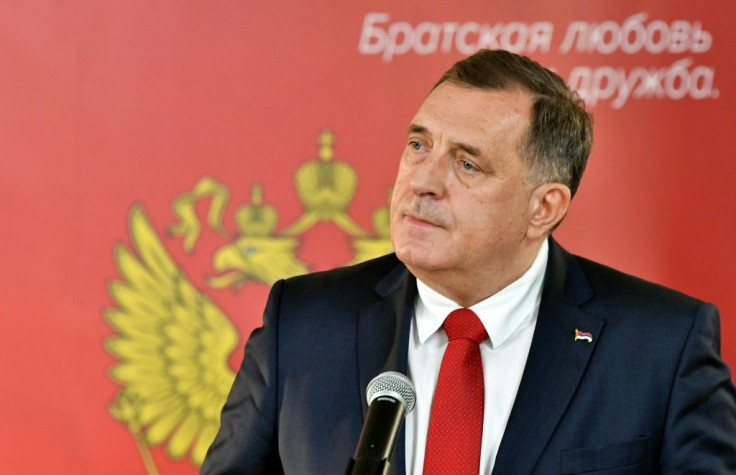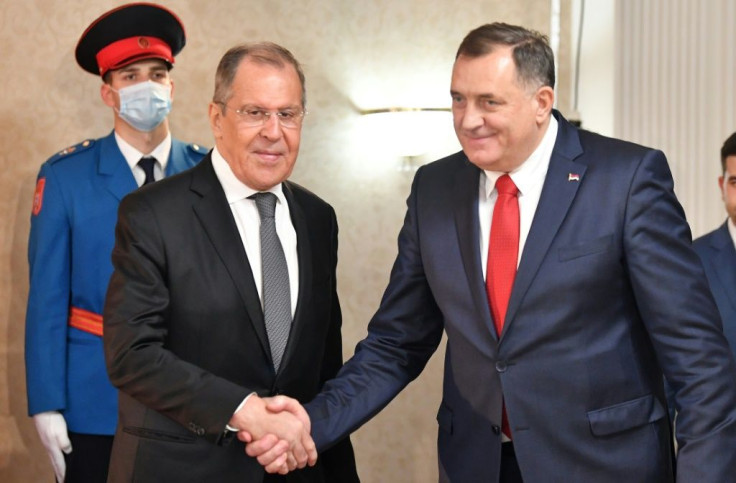Bosnia's Serb Leader Dodik Unveils Plans To Dismantle 'Failed Country'
After more than 25 years of uneasy peace, the leader of Bosnia's Serbs Milorad Dodik has begun making moves to dismantle what he calls the "impossible" state.
The inflammatory rhetoric from the country's co-president is stirring fears that the Balkans' dormant powder keg could ignite again.
For 15 years, Dodik has held the reins of power in Bosnia's Serb entity -- the Republika Srpska -- and has regularly threatened to secede from the rest of the country he openly disdains.
The tone of the one-time social democrat turned ultra nationalist appears to have hardened in recent months as he presented a blueprint to cleave away at Bosnia's fragile foundation, calling the nation a "failed country" and a western "experiment" that "does not work".
Key to his plans include setting up a raft of separate governing bodies while also abolishing the mandate for federal institutions inside the Bosnian Serb republic.
Dodik is also vowing to create his own Bosnian Serb army in the coming months.
Following years of brutal war in the 1990s and nearly 100,000 deaths, NATO intervention in the Bosnian conflict helped hammer out the Dayton Accords, which effectively divided the country along ethnic lines and codified a dizzying bureaucracy aimed at preventing future intercommunal violence.
Bosnia was effectively split in two as a result, giving one half to the country's ethnic Bosnian Serbs while the other was to be ruled by a Muslim-Croat federation.

The two entities remain conjoined by federal institutions -- once weak but gradually beefed up over the years by a United Nations-appointed high representative.
And it is these institutions -- roughly 140 in total according to Dodik-- and their growing strength that the Bosnian Serb leader has set his sights on.
"We will challenge all this," vowed Dodik in a recent press conference. "There is no authority in the world that can stop us".
The plan even has the tacit backing of Moscow, according to Dodik, who presented the details to Russian foreign minister Sergei Lavrov during a meeting in Belgrade earlier this month.
Despite repeated warnings from the UN's High Representative in Bosnia Christian Schmidt, Dodik launched an opening salvo earlier this week with a parliamentary vote to create the Republika of Srpska's own pharmaceutical regulatory agency -- the first in a long list of institutions set to be cobbled together in the coming weeks.
Analysts say the move was most likely a prodding gesture before tackling stronger institutions, like the army, judiciary and tax system.

The roots of the country's current crisis stem from actions taken by Schmidt's predecessor in July, who criminalised the denial of the Srebrenica genocide -- when ethnic Bosnian Serb forces massacred an estimated 8,000 Muslim men and boys in 1995.
The move by the UN high representative triggered outrage among the country's Bosnian Serbs -- many of whom still say Srebrenica did not amount to genocide.
In retaliation, Bosnian Serb officials boycotted federal institutions.
But Dodik's increasingly hostile rhetoric and apparent moves to secede have begun to unsettle fellow Bosnian Serbs, with members of the Republika Srpska's opposition accusing the leader of "endangering peace".
"Unilateral decisions that would call for war are absolutely unacceptable," said opposition leader Mirko Sarovic Tuesday.
The country is facing "the most dangerous crisis since the signing of the Dayton peace agreement", added Sefik Dzaferovic -- the Bosnian Muslim member of the presidency.
Despite the pleas from Dzaferovic and others, the international community has been largely silent on Dodik's latest moves.
Political analyst Tanja Topic said Dodik's aggressive tactics are likely fuelled by his own slipping popularity and the poor showing by his party during municipal elections last year.
"We should not underestimate him this time, [and think] that he is not ready to go all the way. Even if everything he has planned is irrational, unconstitutional and illogical," Topic told AFP.
Zeljko Komsic, the Croatian member of the presidency, said a "plan" already exists to defend Bosnia if Dodik goes ahead with promises to form his own army.
With hostilities rising, Dodik has sought to portray an outer calm and even brought an accordion player to the president's office in Sarajevo this week to help "lighten the mood" as he took sips of brandy.
But others are less serene.
Bosnian columnist Gojko Beric has called for the US and Europe to intervene.
"All analyses show that the war in the former Yugoslavia (in the 1990s) could have been stopped at one point. Before it started," Beric wrote in the daily Oslobodjenje.
"But by the next day it was already too late."
© Copyright AFP {{Year}}. All rights reserved.




















